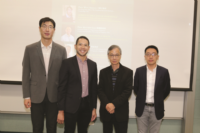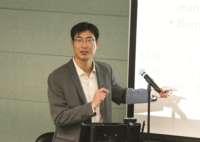The first lecture is delivered by Prof. Wang Shengyu, Assistant Professor in School of Chinese Language and Literature at Soochow University. His research interests include the Chinese classical tale, vernacular religion, Ming-Qing illustrated texts, media and print culture, and translation studies. During the lecture, Prof. Wang focused on the writings of Wang Tao, a reformist thinker and author in the Qing Dynasty. Wang Tao travelled all over Europe and Asia, often visiting countries by ship, trying to learn from foreign experience to help China change and strengthen itself. He had a novel idea that “If Dao 道 is obstructed, qi 器 should be appropriated to allow Dao to attain its ends. Western technological products, such as locomotives, steampowered vessels, and other vehicles, are actually moving embodiments of Dao”. He believes that western tools can also be used as a way to carry Chinese ideas, which is a clear indication of the epoch-making nature of this visionary intellectual.
The second session is delivered by Prof. Matthew Chin, Assistant Professor in Department of Women, Gender, and Sexuality at the University of Virginia, USA. His research interests include history, anthropology, gender and sexuality studies, and critical race and ethnic studies. Prof. Chin talked about the relationship between colonialism and masculinity in 19th century Britain. During that time, the society linked “civilized” and “progress” with masculinity. For instance, military power was a symbol of civilized masculinity, war and colonization were regarded as glorious. The trend of decolonization was also supported by masculinity, which shows that gender stereotyping had a great impact and was closely related to the social and political situation.
The third session is delivered by Prof. Adam Liu, Assistant Professor of Lee Kuan Yew School of Public Policy at the National University of Singapore. His research interests include authoritarian politics, Chinese politics and foreign policy, political culture, and political economy. Prof. Liu focused on the history and consequences of rapid bank development in China. The Chinese government encouraged private banks to be set up by the private sector and corporations, which led to the growth of small and medium-sized enterprises (SMEs). However, the mismanagement of these banks led to the indebtedness of local governments. As a result, there have been changes in the government’s policy. The regulatory and supervisory regime was reorganized to ensure that private banks make efficient use of their assets, combined with a variety of new investment guidelines, in an effort to address the current economic challenges. |
















